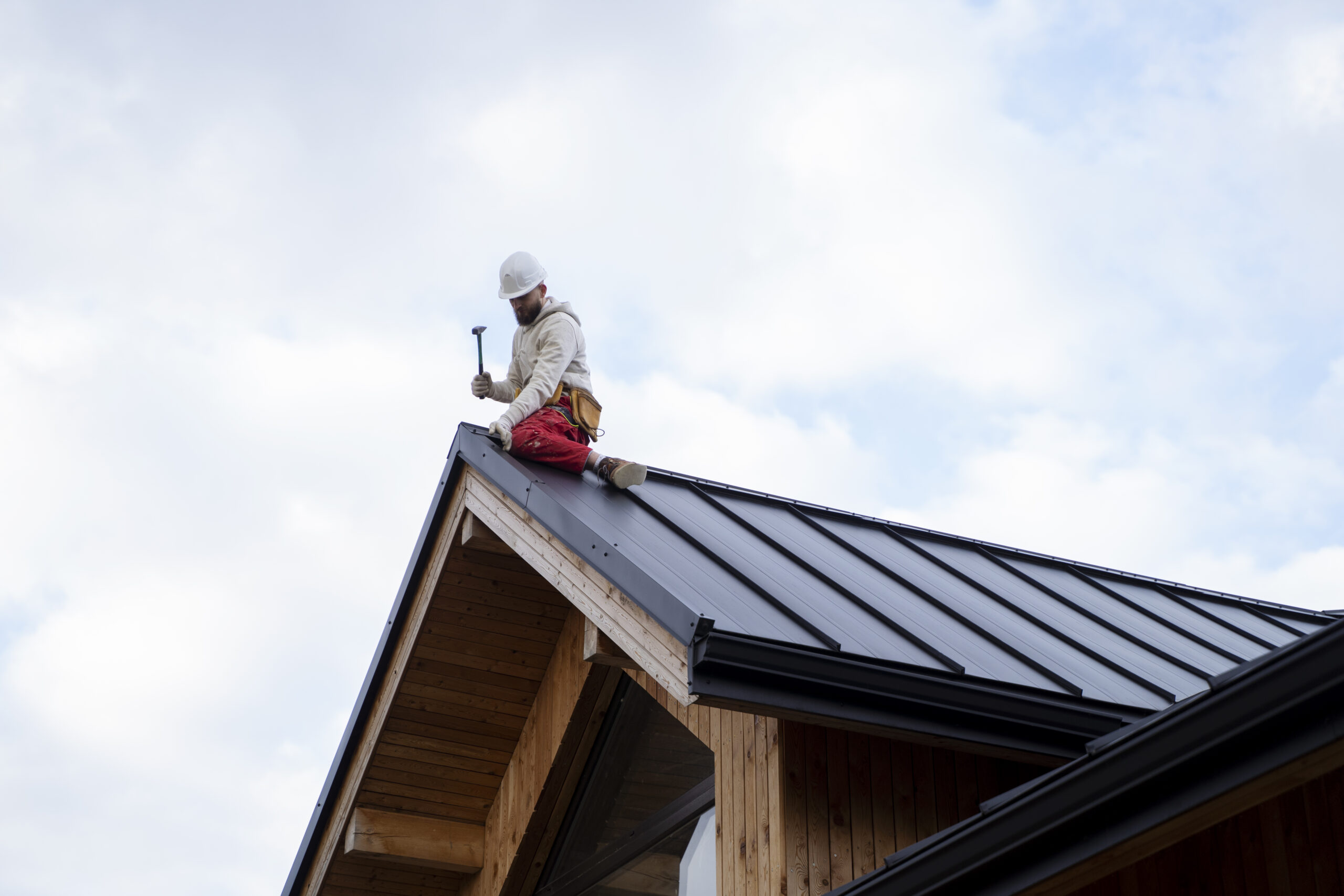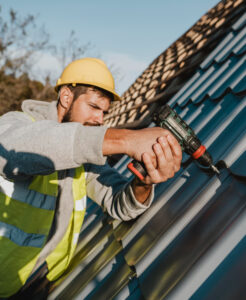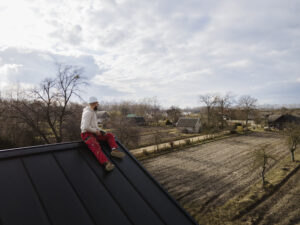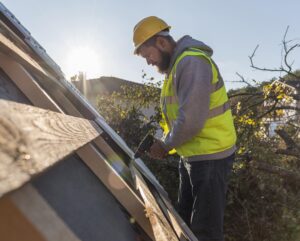Tampa Roofing: Your Expert Guide to Protecting Your Home

Quick Summary / Key Takeaways
If you only remember 5 things from this guide, make it these:
- Understand Tampa’s unique roofing challenges: heat, humidity, and hurricane threats.
- Explore diverse roofing materials: asphalt shingles, tile, metal, and their suitability for Florida.
- Calculate roofing costs in Tampa: factors influencing price and budgeting strategies.
- Learn how to find reputable Tampa roofing contractors: licensing, insurance, and reviews.
- Maintain your Tampa roof: inspections, repairs, and extending its lifespan against the elements.
Tampa Roofing Material Comparison
| Material | Lifespan | Cost (per sq ft) | Pros |
| Asphalt Shingles | 15-30 years | $3.50 – $5.50 | Affordable, versatile, easy to install |
| Tile Roofing | 50-100 years | $10.00 – $20.00 | Durable, fire-resistant, aesthetically pleasing |
| Metal Roofing | 40-70 years | $9.00 – $16.00 | Energy-efficient, long-lasting, weather-resistant |
| Concrete Tiles | 50+ years | $8.00 – $14.00 | Durable, fire-resistant, varied styles |
Tampa Roofing Contractor Checklist
| Factor | Importance | Description | Action |
| Licensing | Critical | Ensures compliance with state regulations | Verify license with Florida DBPR |
| Insurance | Critical | Protects against liability and property damage | Request proof of insurance (liability and workers’ comp) |
| References | High | Provides insights into past performance | Contact previous clients for feedback |
| Warranty | Medium | Guarantees workmanship and materials | Review warranty terms and coverage |
Launch Checklist
- Research Tampa roofing materials suitable for Florida climate.
- Set a realistic budget for your roofing project.
- Obtain multiple quotes from licensed Tampa roofing contractors.
- Verify contractor’s licensing and insurance.
- Review contractor references and past projects.
- Negotiate a detailed contract with clear payment terms.
Follow-Up Checklist
- Schedule regular roof inspections (at least annually).
- Trim trees near the roof to prevent damage from falling limbs.
- Clean gutters regularly to ensure proper water drainage.
- Address minor roof repairs promptly to prevent larger issues.
- Monitor for signs of leaks or water damage inside the home.
- Keep records of all roofing work and maintenance.
Introduction
Tampa’s intense sun, humidity, and hurricane seasons demand resilient roofing solutions. Choosing the right roofing material and a qualified contractor is crucial for protecting your home and investment. This guide provides essential information on navigating the Tampa roofing landscape, from understanding material options to finding reliable professionals. Protect Your Home is the first step to take.
We’ll explore the various roofing materials available, compare their costs and lifespans, and offer practical tips for selecting a contractor you can trust. We aim to empower you with the knowledge to make informed decisions about your roofing project. This includes budgeting, understanding warranties, and ensuring proper maintenance to extend the life of your roof.
By understanding the unique challenges of Tampa’s climate and the nuances of the roofing industry, you can ensure that your home is well-protected for years to come.
Table of Contents
SECTION 1: UNDERSTANDING TAMPA ROOFING CHALLENGES
SECTION 2: CHOOSING THE RIGHT ROOFING MATERIAL
SECTION 3: FINDING A RELIABLE TAMPA ROOFING CONTRACTOR
Frequently Asked Questions
Section 1: Understanding Tampa Roofing Challenges
FAQ 1: What are the primary roofing challenges in Tampa?
Tampa’s main roofing challenges stem from its hot, humid climate and vulnerability to hurricanes. The intense sun can degrade roofing materials, while humidity promotes mold and mildew growth. Hurricanes bring strong winds and heavy rain, posing a significant threat to roof integrity. Proper installation and durable materials are essential to mitigate these risks. Protect Your Investment with proper research. Regular inspections and maintenance are also crucial.
Real Results: After Hurricane Irma, homes with properly installed metal roofs in South Tampa sustained minimal damage compared to those with older asphalt shingles.
Takeaway:
Choose durable materials and ensure proper installation to combat Tampa’s climate challenges.
FAQ 2: How does Tampa’s climate impact roofing materials?
Tampa’s climate significantly impacts roofing materials, accelerating wear and tear. The combination of intense UV radiation, high humidity, and frequent heavy rainfall degrades many common roofing materials. Asphalt shingles can become brittle and crack, while wood shakes are prone to rot and insect infestation. Selecting materials designed for these conditions is vital for longevity and performance.
Real Results: A study showed that asphalt shingles in Tampa have an average lifespan 20% shorter than in cooler climates due to UV exposure.
Takeaway:
Select roofing materials specifically designed to withstand Tampa’s harsh climate conditions.
FAQ 3: What types of roofs are most common in Tampa?
Asphalt shingle roofs are the most common in Tampa due to their affordability and ease of installation. Tile roofs, particularly barrel tile, are also prevalent, offering durability and a distinctive aesthetic. Metal roofing is gaining popularity for its longevity and energy efficiency. The best option depends on budget, aesthetic preferences, and desired lifespan.
Real Results: Over 60% of homes in Tampa utilize asphalt shingles, while tile roofs account for approximately 25% of the market.
Takeaway:
Consider asphalt shingles, tile, or metal roofing based on your budget and desired performance.
FAQ 4: How do hurricanes affect Tampa roofs?
Hurricanes pose a significant threat to Tampa roofs, with high winds capable of tearing off shingles or even entire sections. Wind-driven rain can penetrate underlayment, causing leaks and water damage. Proper roof installation, including hurricane straps and impact-resistant materials, is crucial for minimizing damage. Regular inspections after storms are essential to identify and address any issues.
Real Results: During Hurricane Ian, homes with reinforced roofing systems experienced significantly less damage than those with standard installations.
Takeaway:
Invest in hurricane-resistant roofing and ensure proper installation to protect against storm damage.
FAQ 5: What building codes apply to roofing in Tampa?
Florida Building Codes (FBC) govern roofing in Tampa, with specific requirements for wind resistance, fire resistance, and material standards. These codes are designed to ensure public safety and property protection. Roofing contractors must adhere to these codes during installation and repairs. Homeowners should verify that contractors are familiar with and compliant with the latest FBC regulations.
Real Results: Tampa roofing projects must meet the 2020 Florida Building Code, including wind mitigation requirements for new and replacement roofs.
Takeaway:
Ensure your roofing project complies with the latest Florida Building Codes for safety and compliance.
FAQ 6: How often should a Tampa roof be inspected?
A Tampa roof should be inspected at least annually, ideally in the spring and fall. Regular inspections can identify minor issues before they escalate into costly repairs. After significant weather events, such as hurricanes or severe thunderstorms, a thorough inspection is crucial. Professional inspections can detect hidden damage and ensure the roof’s integrity.
Real Results: Homeowners who conduct annual roof inspections in Tampa save an average of $500 per year in avoided repair costs.
Takeaway:
Schedule annual roof inspections and after major storms to maintain its condition.
FAQ 7: What are the signs of roof damage in Tampa?
Signs of roof damage in Tampa include missing or damaged shingles, leaks in the attic, water stains on ceilings, and granule loss from asphalt shingles. Sagging or discolored areas on the roof surface are also indicators of potential problems. Early detection and repair can prevent further damage and extend the roof’s lifespan. Ignoring these signs can lead to costly repairs.
Real Results: Homeowners who addressed minor roof leaks within 3 months saved an average of $1,500 compared to those who waited longer.
Takeaway:
Watch for signs of roof damage and address them promptly to prevent further issues.
FAQ 8: How does humidity impact roofing materials?
High humidity in Tampa can significantly impact roofing materials by promoting mold and mildew growth. These organisms can degrade roofing surfaces, leading to rot and decay, especially in wood-based materials. Proper ventilation and moisture-resistant materials are essential for combating humidity’s effects. Regular cleaning and maintenance can also help prevent mold and mildew buildup.
Real Results: Homes with poor attic ventilation in Tampa experienced a 30% increase in mold growth compared to those with adequate ventilation.
Takeaway:
Ensure proper ventilation and use moisture-resistant materials to combat humidity’s impact.
FAQ 9: What role does ventilation play in roof longevity in Tampa?
Proper ventilation is crucial for roof longevity in Tampa, as it helps regulate temperature and reduce moisture buildup. Adequate ventilation prevents overheating in the summer, which can damage roofing materials. It also helps remove moisture that can lead to mold, mildew, and rot. A well-ventilated roof can significantly extend its lifespan and reduce energy costs.
Real Results: Homes with proper attic ventilation in Tampa experienced a 15% reduction in energy bills during the summer months.
Takeaway:
Ensure proper attic ventilation to regulate temperature and prevent moisture buildup.
FAQ 10: How does salt air affect roofing materials near the coast?
Salt air can accelerate corrosion and degradation of roofing materials near the Tampa coast. Salt particles can deposit on roofing surfaces, leading to rust on metal roofs and weakening of other materials. Selecting corrosion-resistant materials and regular cleaning are essential for mitigating the effects of salt air. Protective coatings can also help extend the lifespan of roofing materials in coastal areas.
Real Results: Homes within 1 mile of the Tampa Bay coastline experienced a 25% faster rate of corrosion on metal roofs compared to inland areas.
Takeaway:
Choose corrosion-resistant materials and regularly clean your roof near the coast.
Section 2: Choosing the Right Roofing Material
FAQ 11: What are the different types of roofing materials available in Tampa?
Tampa homeowners have a variety of roofing materials to choose from, including asphalt shingles, tile, metal, and concrete tiles. Asphalt shingles are the most affordable and common, while tile offers durability and aesthetic appeal. Metal roofing is known for its longevity and energy efficiency, and concrete tiles provide a balance of durability and style. The best choice depends on individual needs and preferences.
Real Results: Tampa roofing contractors offer a wide range of materials, with asphalt shingles accounting for 60% of installations and tile for 25%.
Takeaway:
Explore asphalt shingles, tile, metal, and concrete tiles to find the best option for your home.
FAQ 12: What are the pros and cons of asphalt shingles in Tampa?
Asphalt shingles are a popular choice in Tampa due to their affordability and ease of installation. They come in various styles and colors, offering aesthetic flexibility. However, they have a shorter lifespan compared to other materials and are susceptible to damage from high winds and UV exposure. Regular maintenance is required to extend their lifespan. Great Roofing Options are available for any need.
Real Results: Asphalt shingles typically last 15-20 years in Tampa, requiring more frequent replacement than tile or metal roofs.
Takeaway:
Consider asphalt shingles for affordability, but be aware of their shorter lifespan and maintenance needs.
FAQ 13: Is tile roofing a good choice for Tampa homes?
Tile roofing is an excellent choice for Tampa homes, offering exceptional durability and aesthetic appeal. Tile roofs are resistant to fire, insects, and rot, and can withstand high winds. They also provide excellent insulation, reducing energy costs. However, tile roofs are more expensive than asphalt shingles and require specialized installation.
Real Results: Tile roofs in Tampa can last 50-100 years, providing long-term protection and value.
Takeaway:
Choose tile roofing for durability, aesthetic appeal, and long-term value, despite the higher initial cost.
FAQ 14: How durable is metal roofing in Tampa’s climate?
Metal roofing is highly durable in Tampa’s climate, offering excellent resistance to wind, rain, and fire. Metal roofs can withstand hurricane-force winds and are not susceptible to rot or insect infestation. They also reflect sunlight, reducing energy costs. While more expensive than asphalt shingles, metal roofs offer a long lifespan and require minimal maintenance.
Real Results: Metal roofs in Tampa can last 40-70 years, providing long-term protection and energy savings.
Takeaway:
Consider metal roofing for its durability, wind resistance, and energy efficiency in Tampa’s climate.
FAQ 15: What are the benefits of concrete tile roofing?
Concrete tile roofing offers a balance of durability, affordability, and aesthetic appeal. Concrete tiles are resistant to fire, insects, and rot, and can withstand high winds. They come in various styles and colors, mimicking the look of clay tile at a lower cost. Concrete tiles also provide good insulation, reducing energy costs. Proper installation is essential for long-term performance.
Real Results: Concrete tile roofs in Tampa can last 50+ years, offering long-term protection and aesthetic value.
Takeaway:
Choose concrete tile roofing for a balance of durability, affordability, and aesthetic appeal.
FAQ 16: How do roofing material costs compare in Tampa?
Roofing material costs in Tampa vary significantly, with asphalt shingles being the most affordable option. Tile and metal roofs are more expensive, but offer longer lifespans and better performance. Concrete tiles fall in between, providing a balance of cost and durability. Homeowners should consider their budget, desired lifespan, and aesthetic preferences when comparing costs.
Real Results: Asphalt shingles cost $3.50-$5.50 per square foot in Tampa, while tile and metal roofs range from $9-$20 per square foot.
Takeaway:
Compare roofing material costs based on your budget, desired lifespan, and aesthetic preferences.
FAQ 17: Which roofing material offers the best energy efficiency?
Metal roofing generally offers the best energy efficiency in Tampa, reflecting sunlight and reducing heat absorption. Tile roofs also provide good insulation, helping to keep homes cool in the summer. Asphalt shingles offer less energy efficiency, but can be enhanced with reflective coatings. Choosing energy-efficient materials can lower energy costs and reduce environmental impact.
Real Results: Metal roofs can reduce cooling costs by up to 25% in Tampa compared to asphalt shingles.
Takeaway:
Choose metal roofing for optimal energy efficiency, or consider tile roofs for good insulation.
FAQ 18: Which roofing material is most resistant to hurricane damage?
Metal roofing is generally the most resistant to hurricane damage in Tampa, withstanding high winds and impact from debris. Tile roofs, when properly installed, also offer good wind resistance. Asphalt shingles are more vulnerable to damage from hurricane-force winds. Choosing materials designed for high wind resistance and ensuring proper installation are crucial for hurricane protection.
Real Results: Metal roofs can withstand winds up to 140 mph, making them a durable choice for hurricane-prone areas like Tampa.
Takeaway:
Choose metal or tile roofing for superior hurricane resistance, ensuring proper installation.
FAQ 19: What are the aesthetic considerations when choosing roofing material?
Aesthetic considerations are important when choosing roofing material, as the roof significantly impacts a home’s curb appeal. Asphalt shingles come in various colors and styles, offering flexibility in design. Tile roofs provide a classic, elegant look, while metal roofs offer a modern, sleek aesthetic. Concrete tiles can mimic the look of clay tile at a lower cost. Homeowners should choose a material that complements their home’s style and neighborhood.
Real Results: Homes with aesthetically pleasing roofs in Tampa often have higher resale values.
Takeaway:
Consider aesthetic appeal when choosing roofing material to enhance your home’s curb appeal.
FAQ 20: What is the lifespan of different roofing materials in Tampa?
The lifespan of roofing materials in Tampa varies depending on the material and environmental conditions. Asphalt shingles typically last 15-30 years, while tile and concrete tile roofs can last 50+ years. Metal roofs can last 40-70 years. Proper installation and maintenance can extend the lifespan of any roofing material. Choosing a durable material can save money in the long run.
Real Results: Homeowners who invest in tile or metal roofs in Tampa can expect to replace their roofs less frequently than those with asphalt shingles.
Takeaway:
Consider the lifespan of different roofing materials when making your choice.
Section 3: Finding a Reliable Tampa Roofing Contractor
FAQ 21: How do I find a reputable roofing contractor in Tampa?
Finding a reputable roofing contractor in Tampa requires careful research and due diligence. Start by asking for referrals from friends, family, and neighbors. Check online review sites like Google, Yelp, and Angie’s List. Verify the contractor’s licensing and insurance. Obtain multiple quotes and compare them carefully. Look for contractors with a proven track record and positive customer reviews.
Real Results: Homeowners who obtained at least three quotes from different contractors in Tampa saved an average of 10% on their roofing projects.
Takeaway:
Research, verify credentials, and obtain multiple quotes to find a reputable roofing contractor.
FAQ 22: What licenses and insurance should a Tampa roofing contractor have?
A Tampa roofing contractor should have a valid state license issued by the Florida Department of Business and Professional Regulation (DBPR). They should also carry liability insurance to protect against property damage and workers’ compensation insurance to cover injuries to workers. Verify that the contractor’s licenses and insurance are current and in good standing. Request copies of their licenses and insurance certificates.
Real Results: Hiring an unlicensed contractor can result in fines and liability for homeowners in Tampa.
Takeaway:
Verify that the contractor has a valid state license, liability insurance, and workers’ compensation insurance.
FAQ 23: How do I verify a roofing contractor’s credentials?
You can verify a roofing contractor’s credentials by checking their license status on the Florida Department of Business and Professional Regulation (DBPR) website. Search for the contractor’s name or license number to confirm that their license is active and in good standing. Contact the insurance company listed on their insurance certificate to verify coverage. Check online review sites for customer feedback.
Real Results: The Florida DBPR website provides free access to license information for roofing contractors in Tampa.
Takeaway:
Check the contractor’s license status on the Florida DBPR website and verify their insurance coverage.
FAQ 24: What questions should I ask a potential roofing contractor?
Ask potential roofing contractors about their experience, licensing, insurance, and warranty. Inquire about the materials they use, their installation methods, and their project timeline. Ask for references from previous clients and examples of their work. Get a detailed written estimate that includes all costs. Clarify the payment terms and any potential change order procedures.
Real Results: Homeowners who asked detailed questions upfront were more satisfied with their roofing projects in Tampa.
Takeaway:
Ask detailed questions about experience, licensing, insurance, warranty, and project details.
FAQ 25: How do I get and evaluate roofing quotes in Tampa?
Obtain at least three roofing quotes from different contractors in Tampa. Provide each contractor with the same information about your project to ensure accurate comparisons. Review the quotes carefully, comparing the materials, labor costs, and warranty terms. Be wary of unusually low quotes, as they may indicate substandard work or materials. Choose a contractor that offers a fair price and a comprehensive proposal.
Real Results: Homeowners who obtained multiple quotes saved an average of 10% on their roofing projects in Tampa.
Takeaway:
Obtain at least three quotes and compare them carefully, considering materials, labor, and warranty.
FAQ 26: What should be included in a roofing contract?
A roofing contract should include a detailed description of the work to be performed, including the materials to be used and the installation methods. It should specify the total cost of the project, including labor and materials. The contract should also include the payment terms, the project timeline, and the warranty information. It should also outline the procedures for handling change orders and resolving disputes.
Real Results: A clear and comprehensive roofing contract protects both the homeowner and the contractor in Tampa.
Takeaway:
Ensure the roofing contract includes a detailed description of the work, costs, payment terms, timeline, and warranty.
FAQ 27: How do I check a roofing contractor’s references?
Ask the roofing contractor for a list of references from previous clients. Contact the references and ask about their experience with the contractor. Inquire about the quality of the workmanship, the timeliness of the project, and the contractor’s communication skills. Ask if they would recommend the contractor to others. Checking references can provide valuable insights into the contractor’s reputation and performance.
Real Results: Homeowners who checked references were more likely to be satisfied with their roofing projects in Tampa.
Takeaway:
Contact previous clients to inquire about their experience with the contractor.
FAQ 28: What are common roofing scams to avoid in Tampa?
Common roofing scams in Tampa include storm chasers who offer quick repairs after a hurricane, contractors who demand large upfront payments, and those who use substandard materials. Be wary of contractors who pressure you to sign a contract immediately or who offer unusually low prices. Always verify the contractor’s credentials and get a detailed written estimate before signing any agreement. Report suspected scams to the authorities.
Real Results: The Better Business Bureau receives numerous complaints about roofing scams in Tampa each year.
Takeaway:
Be wary of storm chasers, high-pressure sales tactics, and unusually low prices.
FAQ 29: How do I handle disputes with a roofing contractor?
If you have a dispute with a roofing contractor, try to resolve it amicably through communication. Document all interactions and keep records of all payments. Review the contract carefully to understand your rights and obligations. If you cannot resolve the dispute, consider mediation or arbitration. As a last resort, you may need to file a complaint with the Florida Department of Business and Professional Regulation (DBPR) or pursue legal action.
Real Results: Documenting all interactions and payments can help resolve disputes with roofing contractors in Tampa.
Takeaway:
Try to resolve disputes amicably, document all interactions, and consider mediation or arbitration.
FAQ 30: Should I use a local or national roofing company?
Choosing between a local and national roofing company depends on your priorities. Local companies often have a better understanding of Tampa’s climate and building codes, and may offer more personalized service. National companies may have more resources and experience, but may not be as familiar with local conditions. Consider the company’s reputation, experience, and customer service when making your decision.
Real Results: Local roofing companies in Tampa often have stronger ties to the community and a better understanding of local regulations.
Takeaway:
Consider both local and national companies, weighing their experience, reputation, and customer service.
Recent Post

Roof Replacement Tampa: Your Complete Guide to a Secure Home

St. Petersburg, FL Roofing: Your Expert Guide





